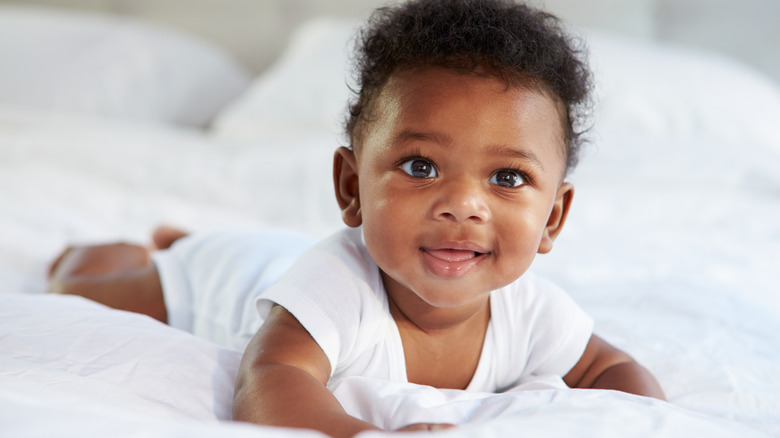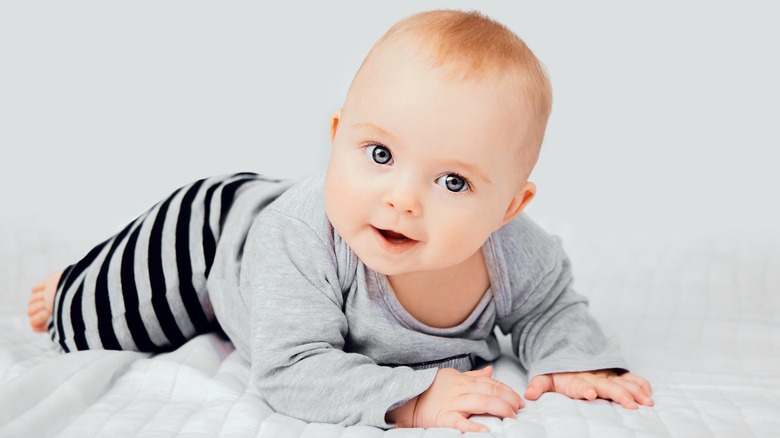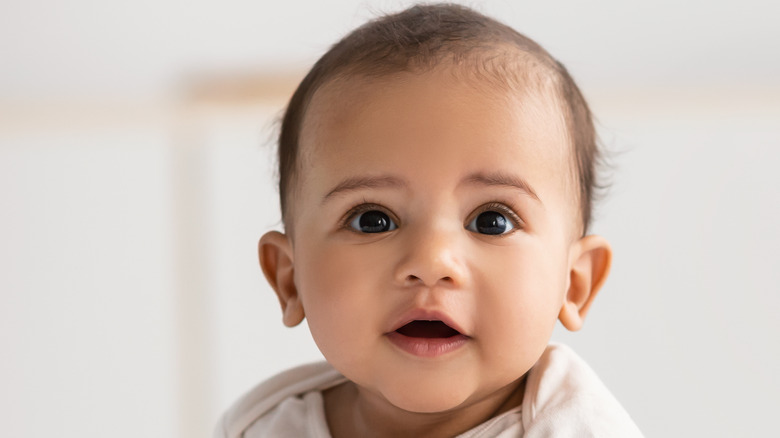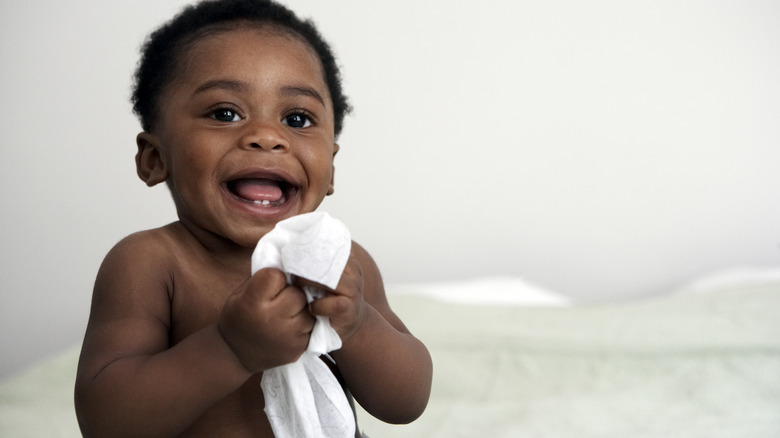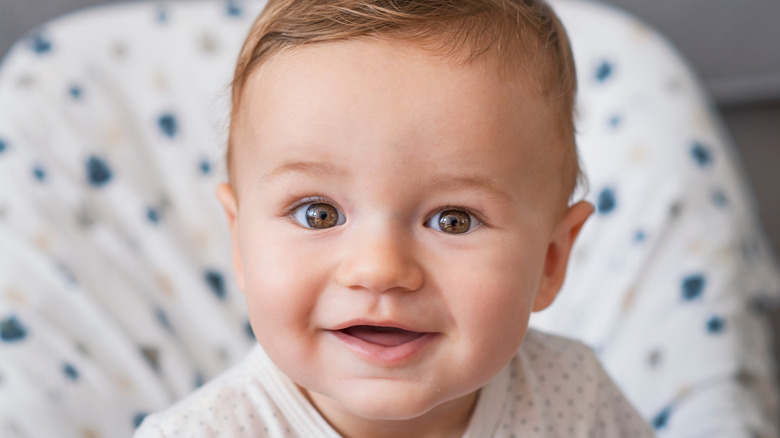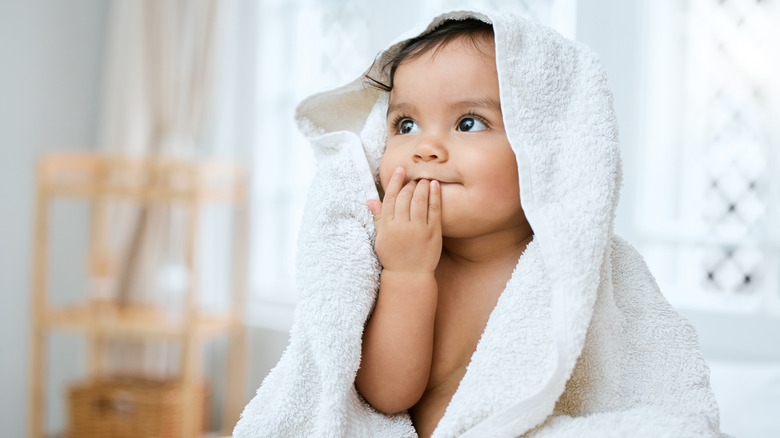Science Says These Baby Names Set Your Kids Up For Success
What parents decide to name their baby often says something about the parents, per QZ, including their ethnic background (via a 2011 article published in the Journal of Personality and Social Psychology) and their socioeconomic status (via a 2009 study published in the Social Science Quarterly). Baby name choice may also influence a child's likes and dislikes, per a 2008 paper published in the Journal of Judgement and Decision Making, as well as the people and circumstances they come to attract, according to a pair of 2008 studies published in the Journal of Managerial Psychology. In fact, what you name your baby may actually have a hand in influencing your baby's likelihood of success.
Here to help is the research conducted by UCLA's Dr. Alfred Mehrabian, which identified, among other things, the 20 baby names most commonly associated with success, according to The Perfect Baby Blog. These names are, in alphabetical order without regard to gender: Catherine, Christopher, David, Elizabeth, Jacqueline, James, Kate, Katherine, Kenneth, Laurraine, Madeleine, Madison, Morgan, Parker, Robert, Ross, Steven, Susan, Thomas, and Victoria. That was in the early aughts. In 2017, Dr. Mehrabian reaffirmed the continuing relevance of his research in an interview with Inc.
What about in the five years since then? Certainly, our culture has evolved, and the science on baby names has been further fleshed out. Accordingly, we thought it prudent to come up with this updated roundup of the baby names that can help set your kids up for success circa 2022:
Noah/Noa
A pair of 2008 studies published in the Journal of Managerial Psychology found that baby names that are more "common" (i.e., not unusual) tend to be regarded as more likable — and we're not just talking about the name itself, but whomever that name is attached to as a moniker. Accordingly, people with more common names tend to have an easier time finding employment than their counterparts with unusual names. In addition, people with unique names may also have higher rates of juvenile delinquency, according to a 2009 study published in the Social Science Quarterly. That being said, the 2009 study authors caution against presuming that the unusual name, itself, is the cause. Rather, as it turns out, unusual names are more common in families whose home environments are disadvantaged in some way, whether economically or otherwise. And those disadvantages, themselves, may increase the likelihood of juvenile delinquency.
All of that taken together, however, leads to the conclusion that while we love these 40 rare baby names, they may not be the right choice if your priority is setting your baby up for success. Rather, you might want to consider going with a baby name that's trending now. Using BabyCenter's ranking of the most popular baby names for 2022, we chose Noah/Noa for this purpose because it's currently topping baby name popularity poles while also veering toward the non-gendered side of the spectrum, as is also all the rage these days, per The Boston Globe.
Avery
The name Avery means "ruler of the elves," according to FamilyEducation. This would tend to have some lovely connotations, especially for Tolkien fans. It also offers some level of gender neutrality, a popular trend in baby naming, and one that may offer females an advantage in the working world, per Entity Mag and 2009 research published in the American Law and Economics Review. However, the reason the name Avery stands to help your child to achieve success in life, regardless of their gender, is that having a more common first initial may make success in life more likely, according to a 2002 study published in the Journal of Experimental Social Psychology.
Certainly, one way to ensure that your child has a common first initial is by choosing a baby name that begins with the letter A — because A is the most popular first initial across male and female genders, according to Behind the Name. Interestingly, none of the 20 names most commonly associated with success, according to research conducted in the early aughts by UCLA's Dr. Alfred Mehrabian begin with the letter A. However, five (i.e., 25%) begin with M or C, both of which are also among the most popular first initials, according to Behind the Name. Other popular first initials across genders include E (which corresponds to the name Elizabeth in Dr. Mehrabian's research) and K (which corresponds to three names identified in Dr. Mehrabian's research).
Amelia/Asher
So, what do we have here — more "A names" on our roundup of baby names that set your kid up for success? Indeed, that's correct. First, these names are popular, and popular names may increase hiring success, per a pair of 2008 studies published in the Journal of Managerial Psychology. Further, people with names beginning with the letter A (and the letter B) are more likely to excel academically than people with names beginning with C, D, and F, according to 2007 research published in the Journal of Psychological Science. As you've probably already pieced together, the letters A, B, C, D, and F, correspond to a near-universal academic grading rubric, in which A is the highest and F means failure.
The 2007 researchers hypothesized that people may "unconsciously pursue" outcomes that "resemble their names" — even when those outcomes are perceived as negative. For example, in baseball, a sport in which the letter K refers to a strike-out, players whose names begin with the letter K tend to strike out more often than other players. Likewise, in students whose names begin with A and B, the aspiration to bring home As and Bs may be greater than in students whose names begin with the other letters — and powerful enough to shape behavior. Indeed, the research also revealed that "students whose names begin with the letters C and D attend lower-ranked law schools than students whose names begin with A and B."
Michael
People who like their name are more likely to be psychologically well-adjusted, according to the authors of a 2006 study published in the Journal of Applied Social Psychology. The reverse is true of people who dislike their name. Being psychologically well-adjusted refers to having the ability to adapt to life's challenges, according to the Encyclopedia of Quality of Life and Well-Being Research. Well-adjusted individuals tend to enjoy greater academic success than those who are less so, according to a 2015 study published in Child Psychiatry and Human Development and a 2019 study published in the Jagannath University Journal of Psychology. In the former, the study subjects were young children. In the latter, the study subjects were adolescents.
It being a truism that popular names are more well-liked, it would therefore seem logical that people with popular names are more likely to like their own names. And as far as popular names go, it doesn't get much more popular than Michael, at least for boys, according to an analysis by the Social Security Administration. While one can't predict whether a child will turn out to like their name — regardless of how popular it might be with the rest of the world, the SSA notes that Michael has been the most popular American baby boy name 44 times out of the last 100 years. This would suggest the name is fundamentally likable. Moreover, it still ranks among the top 35 baby boy names (via BabyCenter).
Sam
The name Sam is among the most popular baby names of 2022, according to BabyCenter. Choosing a popular baby name may offer several advantages when it comes to setting your child up for success. In addition, three-letter names, in particular, lend themselves to a naming technique that may give your child even more of an edge in the game of life. That naming technique, which doesn't have a name of its own (at least not yet), involves giving your child a first name that reads as an acronym of their first, middle, and last initials. For example, if your last name is Meyer, and you name your baby, say, Sam Avery Meyer, then your child will grow up with a first name (Sam) that is the same as their first, middle, and last initials.
Doing so, in and of itself, stands to benefit your child for the simple reason that having any middle initial at all is associated with higher intellectual achievement, according to 2014 research published in European Journal of Social Psychology. Further, a name that reads as an acronym of one's initials is, in essence, a name that serves as a mnemonic device when it comes to name recognition. More memorable names have long been associated with greater success, at least when it comes to branding, according to a 1989 study published in Journal of Consumer Marketing. And with the current trend being influencer marketing, a memorable brand name for your personal brand couldn't hurt.
Steven/Stephen/Stephanie
The name Steven or, as it's sometimes spelled, Stephen, was identified in research conducted by UCLA's Dr. Alfred Mehrabian as the male-gendered name most closely associated with success, per Inc. To the extent that people have become aware — even for no reason other than a general awareness of Dr. Mehrabian's research, that this name, or its feminized variant, Stephanie, is associated with success, the decision to name your baby Steve, Stephen, Stephanie, or an alternatively spelled variant, could actually give your kid an extra edge in terms of success. As Ohio University's Professor James Bruning points out, "the impact of names comes from how people expect to see you" (via BBC Science Focus Magazine). And that can become something of a self-fulfilling prophecy.
Indeed, there are many famous and successful people who have or have had the name Steven or some variation thereof. Just off the top of our heads, we've got Steve Jobs, Steve Wozniak, Steven Spielberg, Stephen Hawking, Stephen King, Stephanie Meyer (author of the Twilight books), Stevie Nicks, and Stefani "Lady Gaga" Germanotta. In each case, did having the name lead to success, or did their individual achievements serve to enhance the successful sound of the name? It could be either. It could be both. Nor does it hurt that the name "Steve" literally means success — or, more specifically, victorious, or a crown or garland that is bestowed on a victor, according to TheBump. We'll get more into literal name associations below.
Charles/Charlie
One thing that many of Dr. Mehrabian's "successful" baby names have in common is an association with a historical figure. Catherine the Great comes to mind, as does James Madison, Queen Elizabeth, Queen Victoria, Jacqueline Kennedy Onassis, Christopher Columbus, and Thomas Jefferson, just for starters. It's not a coincidence, according to Mehrabian (via Inc.). Nor has the passage of time caused these names to acquire any particularly strong negative connotations. That, of course, brings us to "Charles," which, though perennially popular, per Nameberry, didn't make it into Mehrabian's top 20. But perhaps a change is due.
Before King Charles III ascended to the throne, it wasn't uncommon for historians to speculate that when he eventually did, it would be under a different regnal name — i.e., not Charles (via The Guardian and National Post). The reason is that Charles I was deposed, convicted of treason, and subsequently beheaded in 1649 (per Historic Royal Palaces), and while Charles II's demise was far less dramatic, his reign has always been regarded as less than stellar (via National Post). Nevertheless, when the longtime Prince of Wales finally became king, he was elected to rule as Charles III. In so doing, Britain's new king may well have imbued the name, Charles, with a new and hopeful connotation (although only time will tell!). Moreover, Charles lends itself to the nickname Charlie, which, in 2019, was the "most common androgynous name," according to University of Maryland sociology professor Philip N. Cohen (via Family Inequality).
Regis
As you can see from a quick skim of Dr. Mehrabian's top 20 names, a considerable number have also belonged, specifically, to some well-known monarchs and other members of the noble class. Think King David, King James, Catherine II of Russia, Queen Elizabeth, Queen Elizabeth The Queen Mother, and Queen Victoria, which are among the more well-known.
Indeed, a 2013 study published by the Association for Psychological Science suggests that names that connote nobility need not even be the names of actual individuals; they may simply be names that invoke the notion of nobility. For example, Germans with surnames that call to mind noble titles — e.g., Kaiser (which means emporer), Furst (which means prince), and Konig (which means King) — are more likely to be employed in a managerial capacity than Germans with names that call to mind common occupations such as Koch (which cook), Bauer (which means farmer), and Becker (which means baker).
Although the 2013 study concerned surnames, the fact remains that "the status linked to a name may spill over to its bearer and influence his or her occupational outcomes," as the study authors noted. Arguably, no name says "boss" quite like the baby name Regis, which means both "ruler" and "manager," according to Ancestry, and which also has going for it that it's non-gendered.
Jacqueline (as well as Jack and Jackie)
As far as female-gendered names go, none were ranked so high on Dr. Mehrabian's "success" scale as Jacqueline. Mehrabian's research also listed Jacqueline among the names most associated with good health, per Sun Sentinel. But what we ultimately found most persuasive about the name Jacqueline is that it's got what it takes to be the name of a CEO, according to LinkedIn, which conducted its own research on baby names most likely to set kids up for a seat in the C-suite.
Comparing known CEO names with the names of "average LinkedIn professionals," LinkedIn's research revealed that the names most commonly seen among CEOs "tend to be either short or shortened versions of popular first names." According to Dr. Frank Nuessel, who is an expert in onomastics, or the study of proper names, shortened names such as Jack, Fred, and Bill may suggest "friendliness and openness." On the other hand, Dr. Neussel noted that female-gendered CEOs tend to use their full name, which can "project a more professional image." What's particularly noteworthy about the name Jacqueline — in addition to being the name of a well-known and well-loved contemporary historical figure, is that, in terms of setting a kid up for success, it works as both a full name, and it lends itself to friendly shorthand.
Ava/Leo
Both Ava and Leo are among BabyCenter's most popular baby names for 2022, but that's not the only reason these two names stand to set your kid up for success. Nor, in the case of Ava, is it merely the common initial, A, or the fact that names beginning with A correlate with greater academic success, as discussed above. What gives Ava and Leo that extra edge is that both of these names are easy to pronounce. According to Laura Wattenberg, founder of the baby-naming site Baby Name Wizard, easy to pronounce names tend to be perceived as likable and trustworthy (via QZ). As a result, people will be "more likely to answer their email, more likely to swipe right on Tinder," Wattenberg maintains.
In addition, an easy-to-pronounce name can also go a long way toward clearing the path to success since hard-to-pronounce names may come with the baggage of "cultural stereotypes and unjust discrimination." Wattenberg's hypotheses are supported by 2011 research published in the Journal of Experimental Social Psychology, which found, among other things, that individuals whose names are easier to pronounce tend to rise to higher status positions in law firms. Moreover, a 2014 paper published in Scientific American points to various studies demonstrating that people with names that are easier to pronounce tend to be perceived as "more familiar, less risky, and less dangerous" than people with names with more challenging pronunciations.

